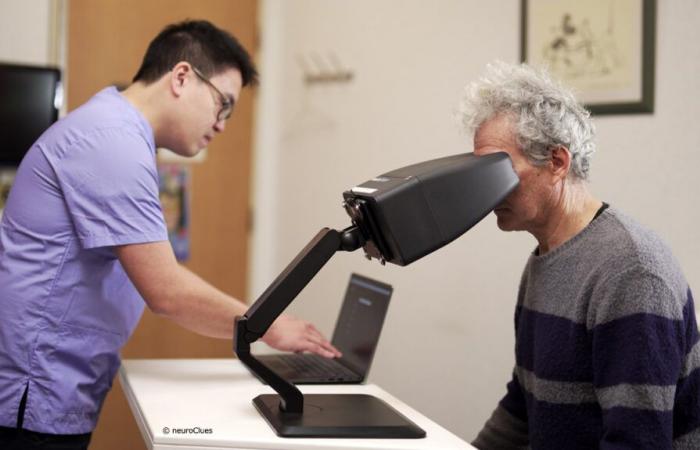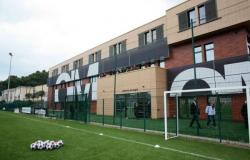
neuroClues, a Franco-Belgian MedTech company specializing in the diagnosis of neurodegenerative diseases, announced that it has received the MDR certificate for its revolutionary eye tracking device.
Innovation in the EU remains achievable with the right support and the right team. In just four years, the company has developed a complete eye tracking system, from incorporation to access to the EU market. By integrating the requirements of the European Medical Device Regulation (MDR) from the initial product design, the company achieved certification within five months, demonstrating the effectiveness and compliance of its innovation process. This achievement was made possible by collaboration with its Notified Body, whose clinical and AI expertise helped facilitate the review process.
“The introduction of neuroClues to the EU market will improve diagnosis and care pathways for millions of European patients, bringing objectivity to current clinical practice. This represents an important inflection point in our mission to improve the diagnosis of neurodegenerative diseases”, declared Antoine Pouppez, CEO and co-founder of neuroClues. “It demonstrates our team’s ability to work in a highly regulated environment with limited resources and proves that MedTech innovation remains possible in the EU.”
This achievement was made possible thanks to the support of investors (White Fund, Graph Ventures, InvestBW, LeanSquare & WING), the Walloon Region and the European Innovation Council (EIC) Fund.
neuroClues aims to combat the pandemic of neurological disorders.
Neurological disorders are a silent pandemic that affects one in three people during their lifetime. The diagnosis is complex and relies mainly on clinical observation, which leads to long diagnostic wandering with a diagnostic error rate of approximately 30%. This prolonged course has a profound impact on the health of patients and seriously affects their neurological condition. Studies show that patients with Parkinson’s disease have lost 50-70% of their dopamine neurons by the time of diagnosis.
neuroClues aims to transform these years of diagnostic wandering into rapid processes lasting a few weeks in order to improve patients’ quality of life through adapted care. The solution will initially target specialists such as neurologists, movement disorder specialists and neuro-ophthalmologists, before expanding to the 2.3 million doctors around the world who currently assess patient health. brain using the traditional test “ follow my finger with your gaze ».
neuroClues: improving neurological care with eye movement biomarkers
The neuroClues device features advanced eye tracking technology using AI to analyze eye movements as biomarkers of neurological disorders. This portable, non-invasive and precise solution complements existing diagnostic methods by extracting multiple biomarkers in 10 minutes while patients visually track a dot on the screen.
“Our unique device aims to provide healthcare professionals with an easy-to-use tool for the early detection of complex diseases such as Parkinson’s disease and other neurodegenerative disorders,” declared Mr. Pouppez.
neuroClues draws on more than 60 years of eye movement research and more than 100,000 publications from leading institutions around the world. Benefiting from the neurology expertise of its founding team and CE marking, neuroClues now links research results and clinical needs, meeting both daily practice and research applications.
Strategic partnerships to foster translational neurological research
neuroClues has established research partnerships with leading studies in Europe and North America. In France, the support of Professor Marie Vidailhet made it possible to expand the recruitment of subjects using neuroClues within the Paris Brain Institute to dozens of participants per week. In the United States, studies have been launched in two large institutions on hundreds of patients suffering from movement disorders.
Other research collaborations are underway, including with Professor Bas Bloem, Director of the Center of Expertise for Parkinson’s Disease and Movement Disorders at Radboud University Nijmegen (Netherlands), who said : “We are excited to be able to use neuroClues’ automated eye movement examination to help us better distinguish patients with atypical parkinsonian syndromes when clinical signs are not yet evident.”
These collaborations demonstrate neuroClues’ commitment to driving evidence-based innovation and advancing the frontiers of neurological research globally.
neuroClues sets up a collaboration with the population cohort Constances to integrate eye movement biomarkers
neuroClues has started discussions with the cohort Constances to integrate eye movement tests into their research on volunteers aged 55 and over. Constancesa renowned French epidemiological mega-cohort of 220,000 participants, offers a unique opportunity to collect data from 25,000 subjects. Supported by France 2030, this project will establish a complete normative database on eye movement biomarkers. It is part of neuroClues’ mission: to exploit eye movement analysis to revolutionize neurological care and enable earlier and more accurate diagnoses.
Pushing boundaries and expanding neurological applications
With its CE mark, neuroClues is ready for deployment in hospitals and clinics across Europe, providing an innovative tool for neurologists and neuro-ophthalmologists. In Italy, Professor Alessandra Rufa plans to develop normative databases with the help of neuroClues and for various neurological conditions, including Parkinson’s disease, Alzheimer’s disease, cerebellar syndromes, myasthenia gravis and myopathies. neuroClues extends beyond Parkinson’s syndromes and finds early adopters among dementia and sports medicine specialists, demonstrating its broad potential for the diagnosis and management of neurological disorders across diverse industries.
Shaping the organization for commercial success with the addition of an experienced commercial director
neuroClues is delighted to announce the appointment of Bart Stulens as Chief Commercial Officer. With over 25 years of business and general management experience in the healthcare industry, including 16 years in senior leadership roles at Medtronic, Bart brings unparalleled expertise in implementing successful product launches and driving market expansion across multiple regions. His addition to the team underscores neuroCles’ commitment to enhancing its commercial capabilities and accelerating its growth trajectory.
Bart Stulens : “neurClues’ mission to ‘develop the brain’s stethoscope’ and revolutionize neurological care through early diagnosis perfectly aligns with my passion for healthcare innovation. I look forward to contributing to the growth of the business and to introduce revolutionary solutions that will make a real difference to people’s lives.”
A new Series A is planned to create a European neurotechnology champion.
Now that it has accessed the market, the company will close a Series A of 10 million euros this semester, 2/3 of which are already committed. Building on its past experience and achievements, the company aims to start developing the sales team and introduce its solution to the European market.



